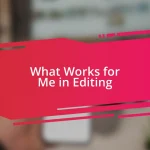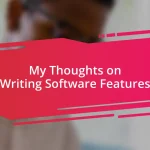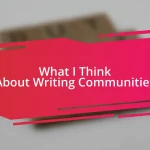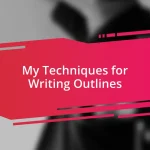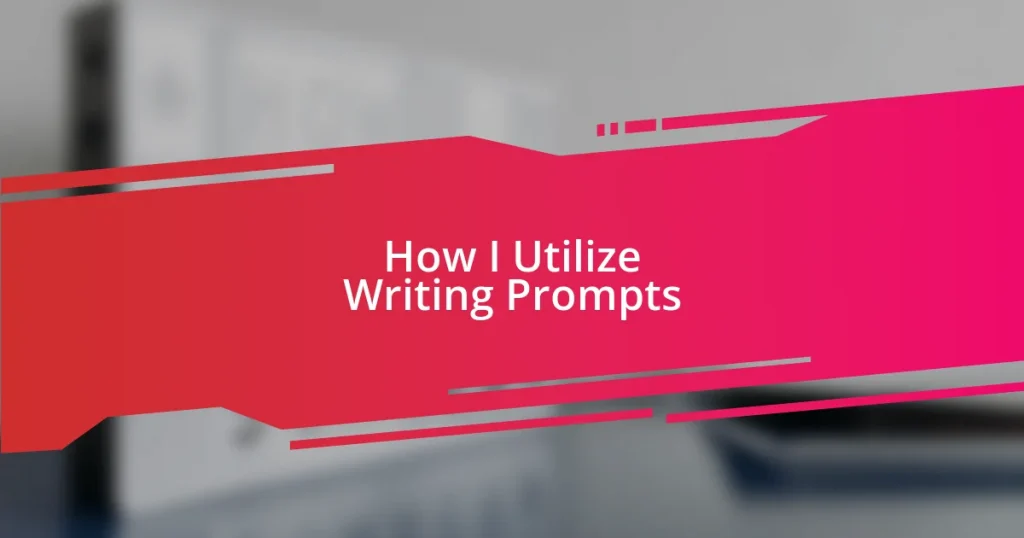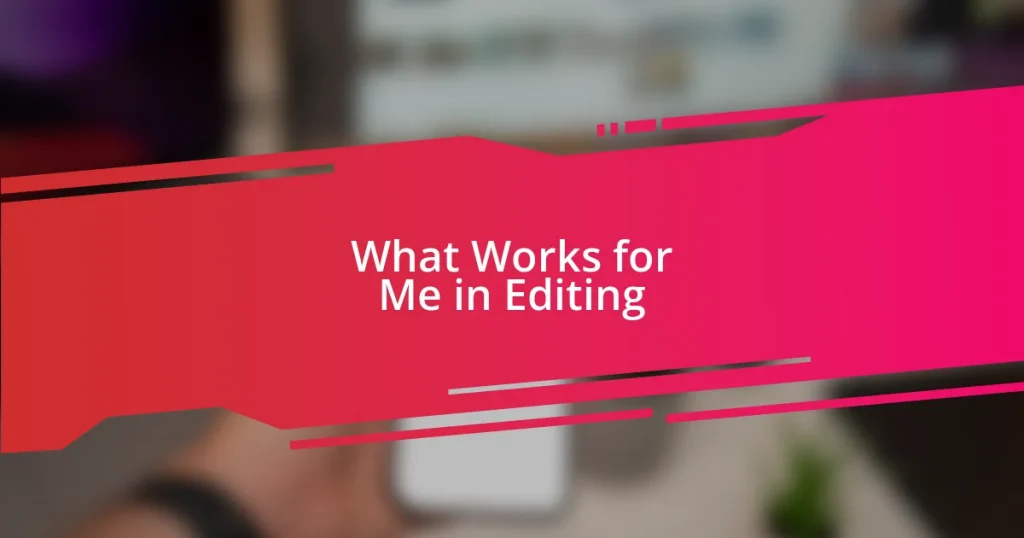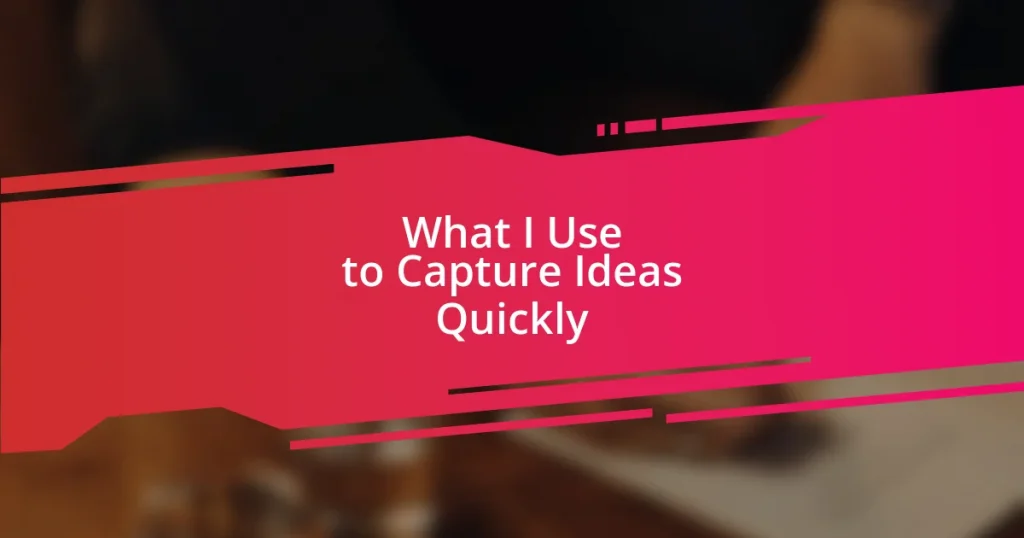Key takeaways:
- Writing prompts enhance creativity by encouraging exploration beyond typical themes and can evoke personal reflections and emotional connections.
- Establishing a consistent writing routine and incorporating prompts revitalizes creativity and helps overcome writer’s block.
- Evaluating writing progress and incorporating feedback from peers fosters growth and deepens storytelling skills.
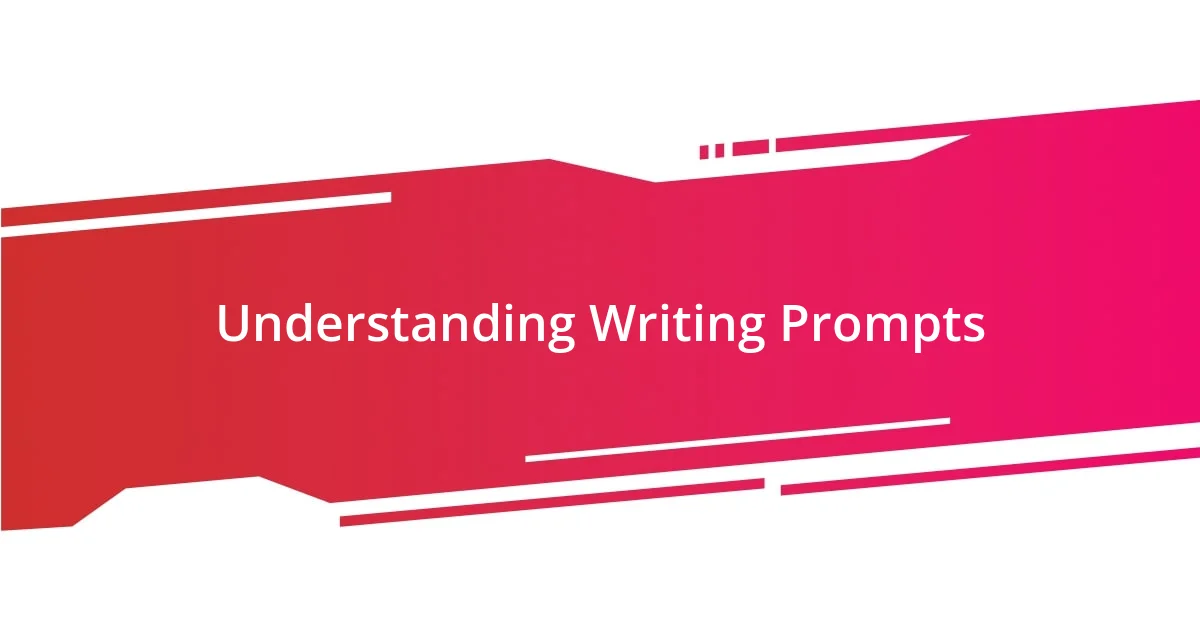
Understanding Writing Prompts
Writing prompts serve as a spark for creativity, helping to unlock the mind’s potential. I remember the first time I used a prompt; it felt like stepping onto a path I hadn’t noticed before. Is there anything quite as exhilarating as discovering a new avenue for your thoughts?
When I encounter a writing prompt, I often feel a blend of excitement and challenge. For instance, one time, a simple prompt about “a forgotten memory” led me to unearth a long-lost childhood experience. The thrill of digging into my own past not only fueled my writing but also deepened my self-awareness. Have you ever found that a single question can unravel a tapestry of memories?
Understanding writing prompts means recognizing their potential to stretch our imagination. They can push us beyond our typical themes and genres, encouraging exploration in writing. It’s like having a friendly nudge, urging us to step outside our comfort zones. How do you think your writing would evolve if you embraced prompts more often?
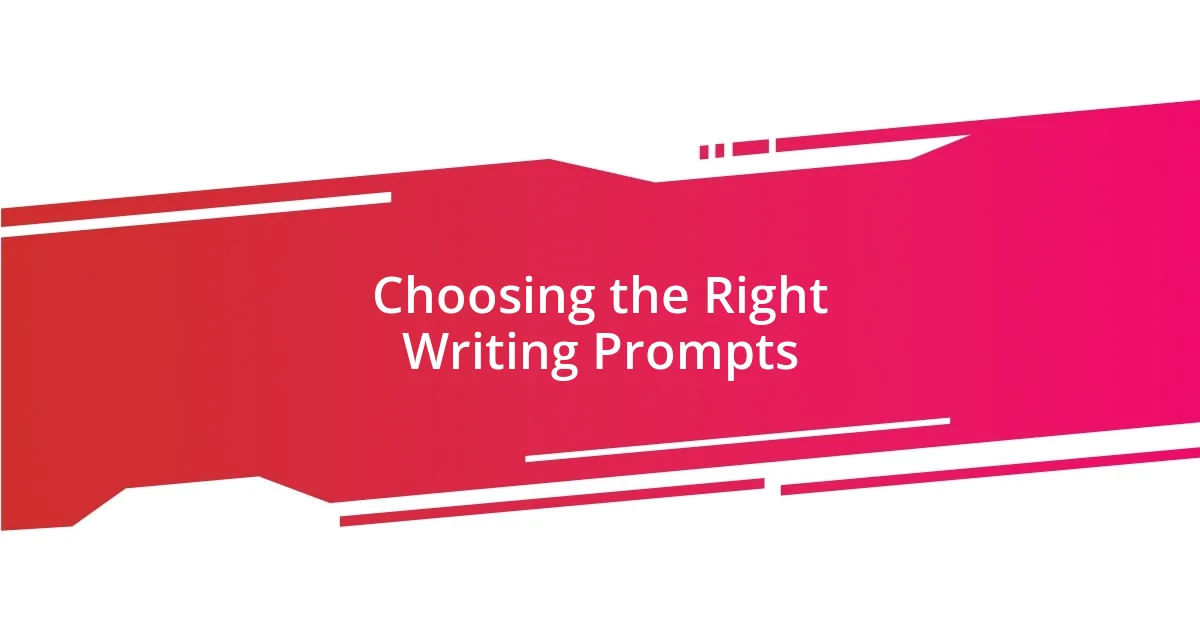
Choosing the Right Writing Prompts
Choosing the right writing prompts can significantly enhance your creative process. When I sift through various prompts, I often seek those that resonate with my personal experiences or aspirations. For example, I once came across a prompt that invited me to write about “the most important lesson I’ve learned.” This one struck a chord as it led me to reflect on some pivotal moments in my life and shaped a piece that felt deeply authentic.
There’s also a balance to strike when selecting prompts. I remember feeling overwhelmed by prompts that felt too broad or generic; they often led to writer’s block. In contrast, a specific prompt like “write about a conversation you wish you had” ignited my imagination and allowed for vivid storytelling. Think about the last time you faced a writing wall—wouldn’t a well-chosen prompt have made a difference?
Moreover, I’ve found that the best prompts often align with my current emotional state. When I was grappling with loss, a prompt about “finding hope in darkness” helped me channel my feelings into my writing. It was cathartic, turning my pain into something meaningful. What kind of emotional connections do your prompts inspire in you?
| Type of Prompt | Benefits |
|---|---|
| Personal Experience | Encourages reflection and authenticity. |
| Specific Themes | Provides focus and stimulates creativity. |
| Emotional Resonance | Facilitates deeper exploration and healing. |
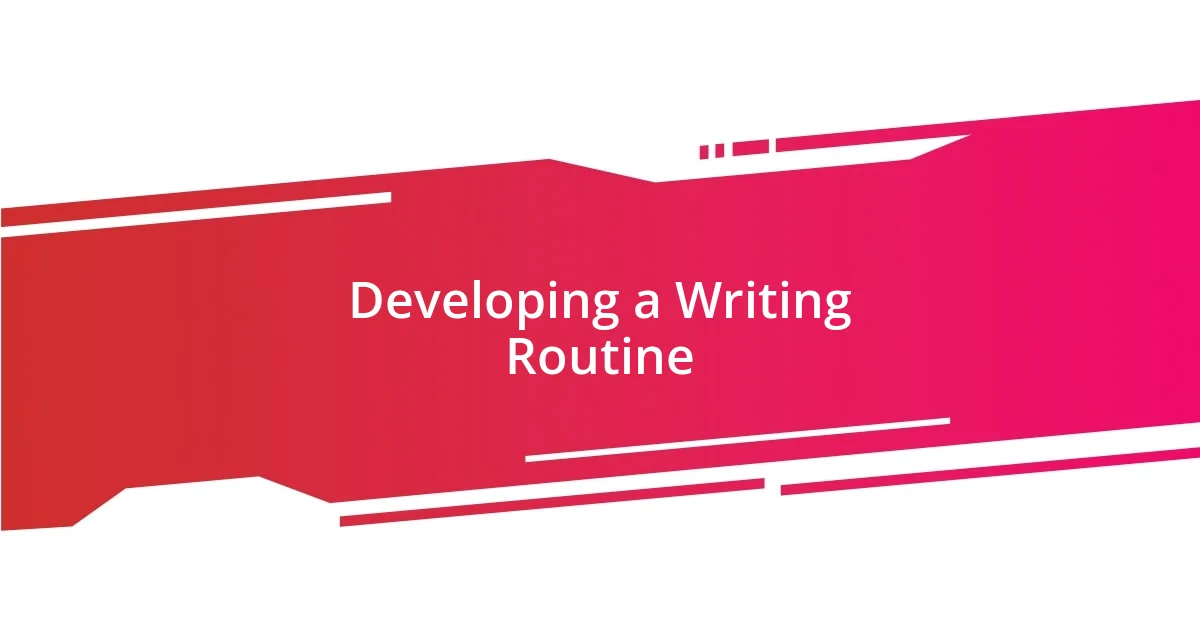
Developing a Writing Routine
Establishing a writing routine is one of the most vital steps I’ve taken to enhance my creativity. I remember a time when my writing was sporadic; inspiration struck when it wanted, leaving me frustrated more often than fulfilled. Setting a specific time each day has not only made writing a priority but has also transformed it into a rewarding habit.
- Choose a consistent time: I’ve found that writing first thing in the morning works best for my flow.
- Create a dedicated space: Having a designated writing nook helps me shift my mindset effectively.
- Limit distractions: I turn off notifications on my devices during writing time, which keeps me focused.
- Set small goals: Starting with just fifteen minutes can ease pressure and build momentum.
Integrating writing prompts into my routine has been an especially joyful discovery. In trying to write regularly, I once dedicated Sundays to exploring new prompts, and the results were remarkable. I found that each prompt offered a delightful escape, fueling my creativity like a breath of fresh air.
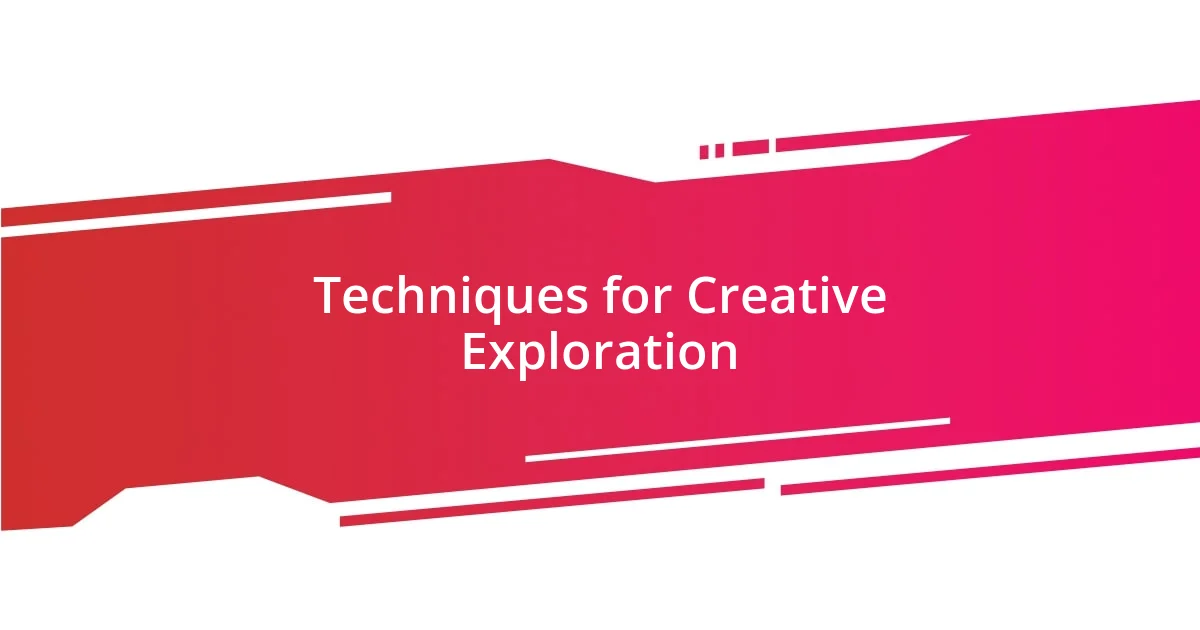
Techniques for Creative Exploration
Exploring creativity through writing prompts often leads me down unexpected paths. I remember a time when I stumbled upon a prompt asking me to describe my ideal day. I let my imagination run wild, weaving in details of tranquil beach sunsets and spontaneous road trips. That exercise opened my eyes to the power of visualization in sparking joy and inspiration within my writing.
In my experience, pairing different techniques with prompts can elevate the creative exploration process. For example, combining a visual element, like a photograph, with a prompt can ignite a whole new dimension of storytelling. A picture I took during a recent hike prompted reflections that became a vivid exploration of nature’s serenity and my inner peace. How often do you find inspiration lurking in the images around you?
I also find that experimenting with various writing styles can enrich my explorative journey. One evening, I challenged myself to write a character’s inner monologue based on a prompt about fear. By stepping into that character’s shoes, I tapped into intense emotions I hadn’t previously explored. This technique transformed my approach to writing, deepening my connection with my characters. What new styles have you experimented with to unlock hidden stories?

Overcoming Writer’s Block
Writer’s block can feel like an insurmountable wall, but I’ve discovered that writing prompts serve as a powerful tool to break it down. There was a particularly challenging afternoon when I sat staring at a blank page. In a moment of desperation, I picked a random prompt, something about a forgotten memory. As soon as I wrote the first line, a flood of nostalgia washed over me, and suddenly, my words flowed like a river.
Sometimes, tackling writer’s block is about shifting perspective. I recall an instance where I found myself endlessly critiquing my work instead of just writing. In moments like these, prompts become a type of playful exercise. When I approached a prompt from a whimsical angle, like writing a story from the perspective of my cat, it not only made me chuckle but also reignited my passion for storytelling. Have you ever noticed how humor can deflate the pressure we put on ourselves?
Moreover, trying out different formats can shake off that creative freeze. I once decided to write a poem based on a prompt about seasons changing. As I explored the rhythm and imagery of my surroundings, the emotion behind the words lifted me out of that slump. Just like that, what began as an obstacle turned into a beautiful moment of expression. What types of formats have you played with to refresh your writing?
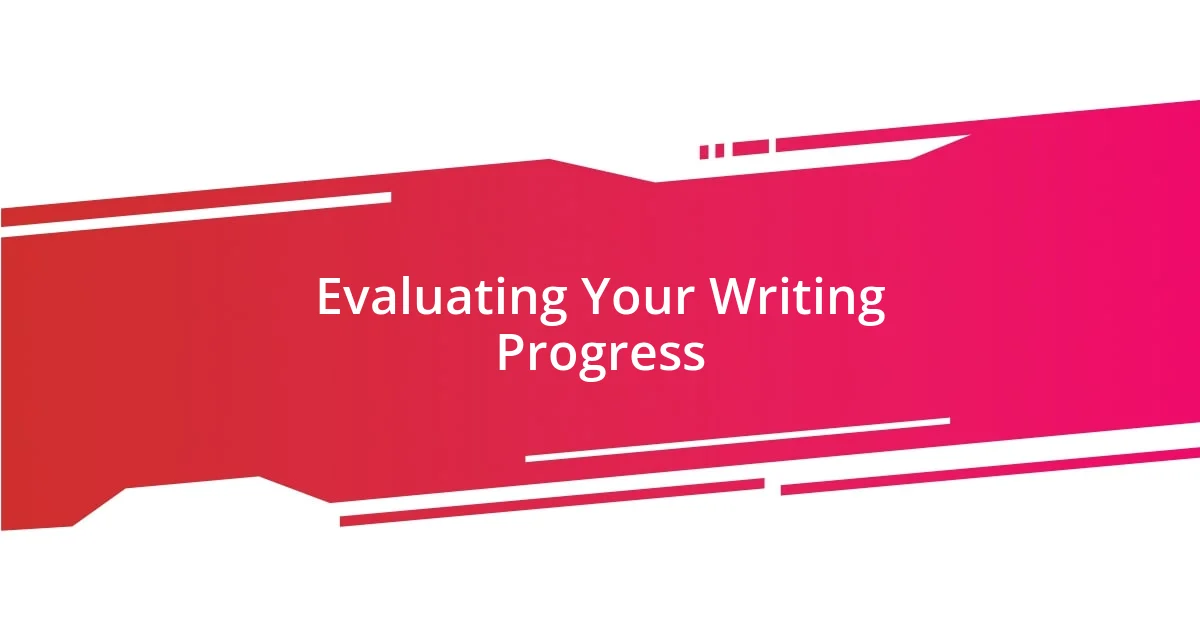
Evaluating Your Writing Progress
Evaluating my writing progress is a crucial step in my creative journey. After completing a series of prompts, I like to take a moment to reflect on what truly resonated with me. For instance, I once revisited a piece I wrote about childhood exploration. While it was rough around the edges, the raw emotion it captured dazzled me, reminding me that sometimes the heart of the piece can outweigh technical flaws. Have you ever felt a piece of writing surprise you in its depth?
I also find that tracking my responses to prompts can illuminate patterns in my growth. Not long ago, I analyzed a collection of journal entries generated from prompts over a few months. I noticed I started embracing vulnerability more openly, shifting from surface-level descriptions to profound revelations about myself. This realization sparked a newfound motivation within me; I wondered, how often do we overlook our evolution as writers until we take a closer look?
Moreover, I believe sharing my work with a trusted peer for feedback is invaluable for evaluating progress. I remember a particular instance when a writing buddy suggested a few tweaks to a story that seemed stagnant. Her insights not only refined my narrative but also highlighted how far I’d come in articulating my voice. Engaging with others can sometimes unlock new perspectives—what insights have you gained from sharing your work?
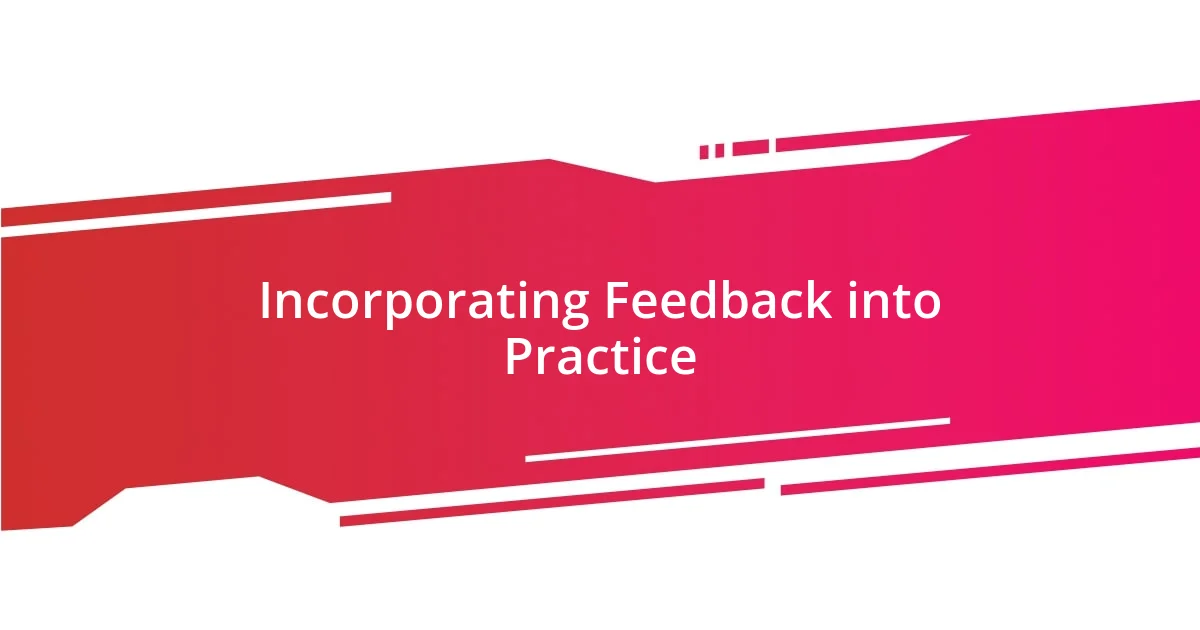
Incorporating Feedback into Practice
Incorporating feedback into my writing practice has been a transformative experience. I remember a time when my mentor critiqued a short story I was proud of, pointing out areas that felt rushed. Initially, I felt defensive, but after I took a breath and reviewed her comments, I realized they opened a door to deeper storytelling. Hasn’t constructive criticism often led you to elevate your work in unexpected ways?
I also find that revisiting feedback over time can reveal different layers of understanding. Recently, I perused some comments from a workshop I attended last year, and it struck me how much my perspective has changed since then. What once felt disheartening now served as brickwork for my growth, like realizing I had overlooked my tendency to shy away from conflict in my characters. When was the last time you revisited feedback and discovered something new?
Sharing my writing with a supportive community has taught me the value of diverse opinions. After an open mic night where I read a piece about loss, the reactions I received filled me with gratitude. One listener shared how my words mirrored their experience, which not only validated my feelings but sparked a connection I never anticipated. Isn’t it fascinating how sharing our stories can build bridges of understanding?
